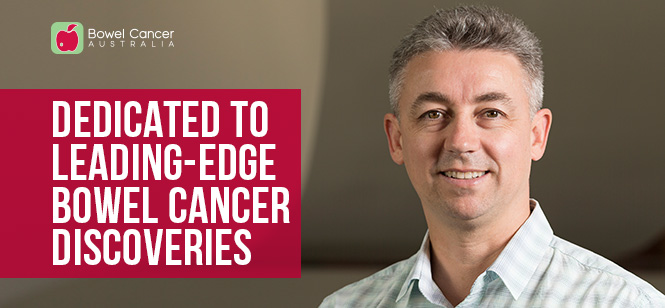When Lawrence Penn was diagnosed with bowel cancer in 1985, the five-year relative survival rate was just 47 percent and life expectancy for newly diagnosed bowel cancer patients with advanced disease was just five months.
But as Lawrence celebrated his 96th birthday in December 2018, the bowel cancer landscape was gratefully a very different one.
Thanks to improvements in early detection, advances in surgery and effective adjuvant chemotherapy to prevent cancer recurrence, an increasing number of patients are living beyond bowel cancer.
“But there is still much work to be done,” says Bowel Cancer Australia chief executive Mr Julien Wiggins said
Bowel cancer remains Australia’s second deadliest cancer, claiming more than 5000 lives each year.
"Sustainable, long-term funding for dedicated cancer research is the only way discoveries are made that can stop bowel cancer from occurring or to find a cure if it has," he added.
That is exactly what Bowel Cancer Australia provided just under 12 months ago, with the establishment of the Lawrence Penn Chair of Bowel Cancer Research and recruitment of Professor Mark Molloy.
Bowel cancer research received a major boost in 2018 with $10.4 million in funding to establish the inaugural Lawrence Penn Chair of Bowel Cancer Research.
The Lawrence Penn Chair of Bowel Cancer Research is named after one of Australia's oldest bowel cancer survivors and is based at the University of Sydney's Northern Clinical School, Royal North Shore Hospital’s Campus.
“Contributing $6.4 million directly, Bowel Cancer Australia’s funding has greatly expanded Australia's research capacity and we anticipate the Chair will be a game changer for bowel cancer research in this country,” Mr Wiggins said.
An endowed professorial chair is recognised as a University's finest scholar in their field of expertise. They provide a research focal point in the country they are located, helping to attract and retain the brightest researchers and spur colleagues to their finest efforts - benefiting the entire Australian community.
Which is why we were so pleased to announce the establishment of the Lawrence Penn Chair and the inaugural Professor of Bowel Cancer Research, Professor Mark Molloy PhD.

A biochemist who has developed his expertise in the science of 'proteomics', Professor Molloy is internationally recognised as an expert in the application of mass spectrometry in biomedical research.
With focus areas in translational cancer research, biomarker studies and cell signalling, a major theme of Professor Molloy’s research has been to use mass spectrometry to better understand how cells carry out a myriad of functions in health and disease.
The commencement of Professor Molloy as the Lawrence Penn Chair of Bowel Cancer Research is the culmination of many years of support from dedicated donors, enthusiastic fundraisers and corporate partners.
Thanks to our supporters, the significant $6.4 million investment will be dedicated to leading-edge bowel cancer discoveries, sustainably funding research well into the future.
We hope in time; our collective investment will have a lasting impact on Australia’s health future through bridging advanced pioneering research areas of mass spectrometry and proteomic research with clinical medicine.
Many gene mutations lead to changes in protein function and most of the drugs used to treat cancer interact with proteins, so cancer proteomics is an important new frontier in cancer research.
We also now know not all bowel cancers are the same and cutting-edge new research could assist in the move away from a one size fits all treatment approach towards more personalised medicine.
Some of the challenging questions Professor Molloy and his team will be looking to answer include –
- Why do only some polyps develop into bowel cancer?
- Which cancers might spread to other parts of the body?
- What role does gut bacteria and the immune system play in relation to disease and prevention?
- Can drug treatments be further optimised for individual bowel cancer patients?
Watch this space for further updates on the research projects being undertaken by Professor Molloy and his team, exciting outcomes of their work and further research funding opportunities they have secured.






